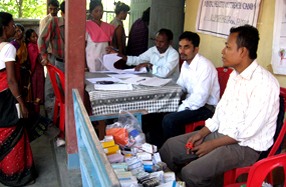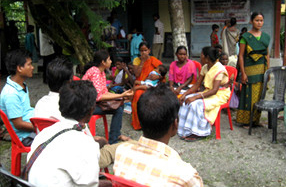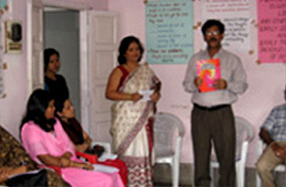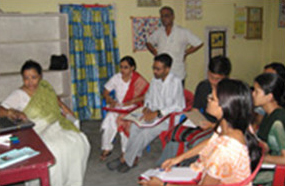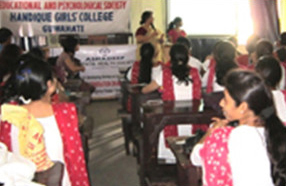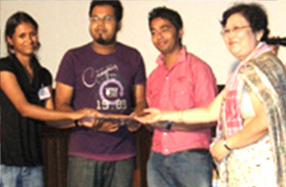PAST PROJECTS
Outreach Mental Health Camps
There are certain areas in Assam from where many of the homeless mentally ill women at Navachetana belong. Ashadeep had conducted Outreach programmes in these areas with the hope that these camps would help in preventing future cases. From the year 1998, Outreach Programmes were initiated with the help of volunteers (mostly family members). In the first stage, Ashadeep developed a network of trained volunteers in 9 regions of Assam. The workers were given basic training at the Ashadeep centre at Guwahati to be able to identify the mentally disabled in their respective places and at the same time, create awareness for their treatment and rehabilitation. A local committee consisting of prominent people from the area and guardians of persons with mental illness was formed. With the help of this group of people and a team of doctors and other professional from Guwahati, monthly Mental Health camps were organized. This led to the opening of small Day Care Centers at Khetri and Morigaon.
From October 2006 to January 2008, 15 monthly Outreach camps were conducted at Sipajhar in Darrang district, in association with a local NGO (SATRA). The response had been overwhelming and beyond any expectation resulting in the establishment of ‘Ashroy’- ‘Day Rehabilitation Centre for the Mentally Disabled’, which was inaugurated in August’2007. With training and resource material support from Ashadeep, this centre has progressed reasonably well.
The Outreach camps initiated by Ashadeep in June 2007, in collaboration with ‘the ant’ at Rowmari was perhaps the first initiative in modern mental health intervention in the Bodo Territorial Council (BTC) area, consisting of four districts. Till date there is no other Psychiatric interventions available in the whole area, and most people had no idea, that medical interventions could help their relatives who are behaving in an ‘abnormal’ way. The impact of this initiative can be gauged from the fact that, 18 camps were conducted during June,2007 to May,2009, where 290 patients received treatment from Ashadeep. In one of the camps,14 patients had come all the way from the Bhutan border, and they were from just one refugee camp. The volunteers of ‘the ant’ who are all health workers working with malaria and stomach ailments have been trained on the basics of mental health interventions by Ashadeep. The Manual ‘Working in Mental Health with the Community’ now also translated to Assamese and also the posters and pamphlets developed by us in the Bodo language have helped.
After 18 Outreach camps at Raumari (Chirang), our partner organization ‘the ant’ has been sufficiently empowered in the area of mental health to continue with the camps on their own, with some support from Ashadeep.
As the Outreach intervention in Mental Health at Rowmari has been the only access to Psychiatric Care in the Bodoland Territorial Council areas, there was an increasing demands from the population of Kokrajhar, the Headquarters of BTC to initiate such a programme. We felt that such a move would help in opening the eyes of the Council Administration which is based there.
We tied up with two organizations NERSWN in Kokrajhar since March,2009 and Bosco Reach Out in Kumarikata since October,2009 where outreach mental health camp were conducted regularly.
Some outcomes of the Outreach programmes were
A free weekly Outdoor clinic had started functioning from August 2006 at a clinic in Guwahati. The following groups of patients are provided with free Psychiatric treatment, medications and rehabilitation advice and interventions from the Outdoor clinic-
Roshmi-Half Way Home for Women with Mental Illness
Roshmi was the first Half-Way Home for persons with mental illness in the North Eastern states of India. At ‘Roshmi’, facilities were developed to take care of 25 persons at a time.
A Half Way Home, as the name implies, was a stepping stone for a person with major mental illness who has received medical treatment and has recovered from an acute stage, but needs interventions to develop skills of daily living, interpersonal interactive skills and vocational skills. A stay of six to nine months in such a setting helps in the final rehabilitation of the recovering person in the family and community
Roshmi is the first initiative of Ashadeep in the field of residential rehabilitation. This was a long felt need because the daycare centres were addressing the needs of the local population only. But with the gradual spread of awareness of the needs of rehabilitation, demands of such residential rehabilitative facilities were felt by people from other parts of the region. Residential rehabilitation facilities could also address the tasks of living and social skill development in a more holistic way.
In trying to structure the daily routines of a recovering person, the programmes of Roshmi were worked out in terms of household chores, therapy, physical exercise, prevocational, vocational activity and recreation. For instance, the simple act of buying vegetables or deriving pleasure by watching a movie helps them counter negative symptoms like lack of motivation to do anything. For more serious vocational activity leading to livelihood generation, the Ashadeep Day Rehabilitation centre and sheltered workshop became a support structure.
Roshmi had provided rehabilitation services to 229 women with mental illness within a span of 7 years……….
Prashantiloy
A very vulnerable group of family care-givers of persons with mental illness are older people who have retired from active service. These elderly care-givers require peer support as well as an outlet to their problems of coping with a family member affected by mental illness as this could take a toll on their own health. Due to the physical, psychological and emotional problems of old age, the feeling of loneliness and frustration has also become very common amongst our elderly populations. To provide respite, recreation and care to the elderly group of family care-givers as well as other older people going into isolation within their families, a Day Care and Recreational Centre for the elderly – Prashantiloy, was promoted by Ashadeep in the month of October 2003. An attempt was made to improve the quality of life of disadvantaged elderly people through supportive health care, group activity, counselling, recreational activities and income generation by utilization of existing skills or by learning new skills. Here, it has to be clarified that at Ashadeep, because of the nature of work, the term ‘disadvantaged people’ does not mean economically poor people only, but also people who have been disadvantaged due to mental and physical health or psychosocial environment.
Weaving, stitching and tailoring, production and packaging of food products are the major areas of vocational activity so far. A temporary sale counter has started operating from Prashantiloy where fresh pickles, juices, sweets, salted snacks and hand-woven cloth and gamochas are being sold. The expenses for the rent and maintenance of premises, mid-day meals for the members and other recurring costs are met from the sale of packaged food products produced at the Centre. Periodic health check-ups, free medication, Yoga therapy, recreational and library facilities, outings and nutritious food are provided at the center. The members themselves have developed a programme under which they visit schools and interact with the children through story telling sessions. Interactive sessions have been also been organized between the members and college students so that they can understand each others’ needs and feelings.
In April,2009, Ashadeep had withdrawn from Prashantiloy as the members were empowered to run the Day Recreational Centre of their own. Ashadeep is proud to state that the elderly members of Prashantiloy have very efficiently managed to sustain the centre.
Counselling
Face to Face and Telephonic-“Paritranam” helpline through which free and confidential emotional support were provided for the depressed and sucidal. The helpline had addressed needs of all age groups and all kinds of mental health issues. Initiated in the year 2012 ‘Paritranam’ had received 233 calls and 251 individuals were given face to face counseling by trained counselors of Ashadeep. sustain the centre.
Development of Community Resources for promoting Mental Health Care in the North Eastern Region’
The project ‘Development of Community Resources for promoting Mental Health Care in the North Eastern Region’ supported by North East Network, Guwahati was carried out during the period December’2006 to November’2007. Under this project we have developed a training manual –‘Working with mental health in the Community’, a resource book to help Care-Givers other than mental health professionals in providing services to persons with mental illness. Pamphlets and posters in five languages viz. English, Assamese, Bodo, Bengali and Khasi have been developed to create awareness.
Under this project six organizations – the ant (Bongaigaon), SATRA (Sipajhar), Prerona (Jorhat) and Deshabandhu Club (Silchar), all from Assam; Bethany Society (Shillong), Meghalaya and Swabalamban (Agartala), Tripura are being provided training and other support under the project to initiate service facilities for rehabilitation of persons with mental illness
This initiative has resulted in the creation of Mental Health Interventions in six areas of three States of the NE region, where there were no such activity at the community level earlier. The training modules and resource material developed will help in reaching out to new geographical areas in the future.

